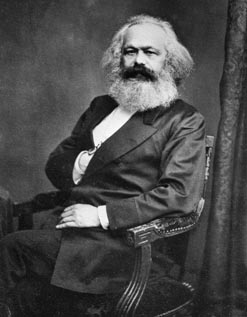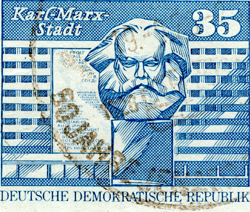| Profiles > Philosophy > Karl Marx | |||||||||||||||||
| Karl Marx | |||||||||||||||||
|
|||||||||||||||||
|
Marx has been described as one of the most influential figures in human history. Marxist concepts took power in a variety of countries in the 20th century, leading to the formation of such socialist states as the Soviet Union in 1922 and the People's Republic of China in 1949. Many labor unions and workers' parties worldwide are influenced by Marxism, while various theoretical variants, such as Leninism, Stalinism, Trotskyism, Maoism, and Dengism were developed from them. Marx is typically cited, with Émile Durkheim and Max Weber, as one of the three principal architects of modern social science. Childhood and early education -- Karl Heinrich Marx was born on 5 May 1818 to Heinrich Marx and Henrietta Pressburg. He was born at 664 Brückergasse in Trier, a town then part of the Kingdom of Prussia's Province of the Lower Rhine. Ancestrally Ashkenazi Jewish, his maternal grandfather was a Dutch rabbi, while his paternal line had supplied Trier's rabbis since 1723, a role taken by his grandfather Meier Halevi Marx. Karl's father, as a child known as Herschel, was the first in the line to |
||||||||||||||||
| receive a secular education; he became a lawyer and lived an upper middle-class existence, with his family owning a number of Moselle vineyards. | |||||||||||||||||
|
In October 1835 at the age of 17, Marx travelled to the University of Bonn wishing to study philosophy and literature: however, his father insisted on law as a more practical field. Due to a condition referred to as a "weak chest," Karl was excused from military duty when he turned 18. While at the University at Bonn, Marx joined the Poets' Club, a group containing political radicals that was being monitored by the police. Marx also joined the Trier Tavern Club drinking society (Landsmannschaft der Treveraner), at one point serving as club co-president. Additionally, Marx was involved in certain disputes, some of which became serious: in August 1836 he was involved in an altercation with a member of the university's Borussian Korps. Although his grades in the first term were good, they soon deteriorated, leading his father to force a transfer to the more serious and academic University of Berlin. |
|||||||||||||||||
|
|||||||||||||||||
| understand the workings of capitalist society, the factors governing the process of history and how the proletariat could help bring about a socialist revolution. Unlike previous philosophers, Marx was not only interested in discovering the truth. As he was to write later – | |||||||||||||||||
| In the past, philosophers have only interpreted the world in various ways; the point is, to change it. | |||||||||||||||||
|
|||||||||||||||||
| the meeting it was decided that the aims of the organisation was "the overthrow of the bourgeoisie, the domination of the proletariat, the abolition of the old bourgeois society based on class antagonisms, and the establishment of a new society without classes and without private property". | |||||||||||||||||
The Communist Manifesto -- begins with the assertion, "The history of all hitherto existing society is the history of class struggles." Marx argued that if you are to understand human history you must not see it as the story of great individuals or the conflict between states. Instead, you must see it as the story of social classes and their struggles with each other. Marx explained that social classes had changed over time but in the 19th century the most important classes were the bourgeoisie and the proletariat. By the term bourgeoisie Marx meant the owners of the factories and the raw materials which are processed in them. The proletariat, on the other hand, own very little and are forced to sell their labor to the capitalists. Marx believed that these two classes are not merely different from each other, but also have different interests. He went on to argue that the conflict between these two classes would eventually lead to revolution and the triumph of the proletariat. With the disappearance of the bourgeoisie as a class, there would no longer be a class society. As Engels later wrote -- The state is not abolished, it withers away. The Communist Manifesto was published in February, 1848. The following month, the government expelled Marx from Belgium. Marx and Engels visited Paris before moving to Cologne where they founded a radical newspaper, the New Rhenish Gazette. The men hoped to use the newspaper to encourage the revolutionary atmosphere that they had witnessed in Paris. After examples of police brutality in Cologne, Marx helped establish a Committee of Public Safety to protect the people against the power of the authorities. The New Rhenish Gazette continued to publish reports of revolutionary activity all over Europe, including the Democrats seizure of power in Austria and the decision by the Emperor to flee the country. Marx's excitement about the possibility of world revolution began to subside in 1849. The army had managed to help the Emperor of Austria return to power and attempts at uprisings in Dresden, Baden and the Rhur were quickly squashed. On 9th May, 1849, Marx received news he was to be expelled from the country. The last edition of the New Rhenish Gazette appeared on 18th May and was printed in red. Marx wrote that although he was being forced to leave, his ideas would continue to be spread until the "emancipation of the working class". Das Kapital Despite all his problems Marx continued to work and in 1867 the first volume of Das Kapital was published. A detailed analysis of capitalism, the book dealt with important concepts such as surplus value (the notion that a worker receives only the exchange-value, not the use-value, of his labor); division of labor (where workers become a "mere appendage of the machine") and the industrial reserve army (the theory that capitalism creates unemployment as a means of keeping the workers in check). In the final part of Das Kapital Marx deals with the issue of revolution. Marx argued that the laws of capitalism will bring about its destruction. Capitalist competition will lead to a diminishing number of monopoly capitalists, while at the same time, the misery and oppression of the proletariat would increase. Marx claimed that as a class, the proletariat will gradually become "disciplined, united and organised by the very mechanism of the process of capitalist production" and eventually will overthrow the system that is the cause of their suffering. Marx now began work on the second volume of Das Kapital. By 1871 his sixteen year old daughter, Eleanor Marx, was helping him with his work. Taught at home by her father, Eleanor already had a detailed understanding of the capitalist system and was to play an important role in the future of the British labor movement. On one occasion Marx told his children that -- Jenny (his eldest daughter) is most like me, but Tussy (Eleanor) is me. | |||||||||||||||||
|
Credits
http://en.wikipedia.org/wiki/Karl_Marx http://www.spartacus.schoolnet.co.uk/TUmarx.htm http://www.bbc.co.uk/history/historic_figures/marx_karl.shtml |
|||||||||||||||||











